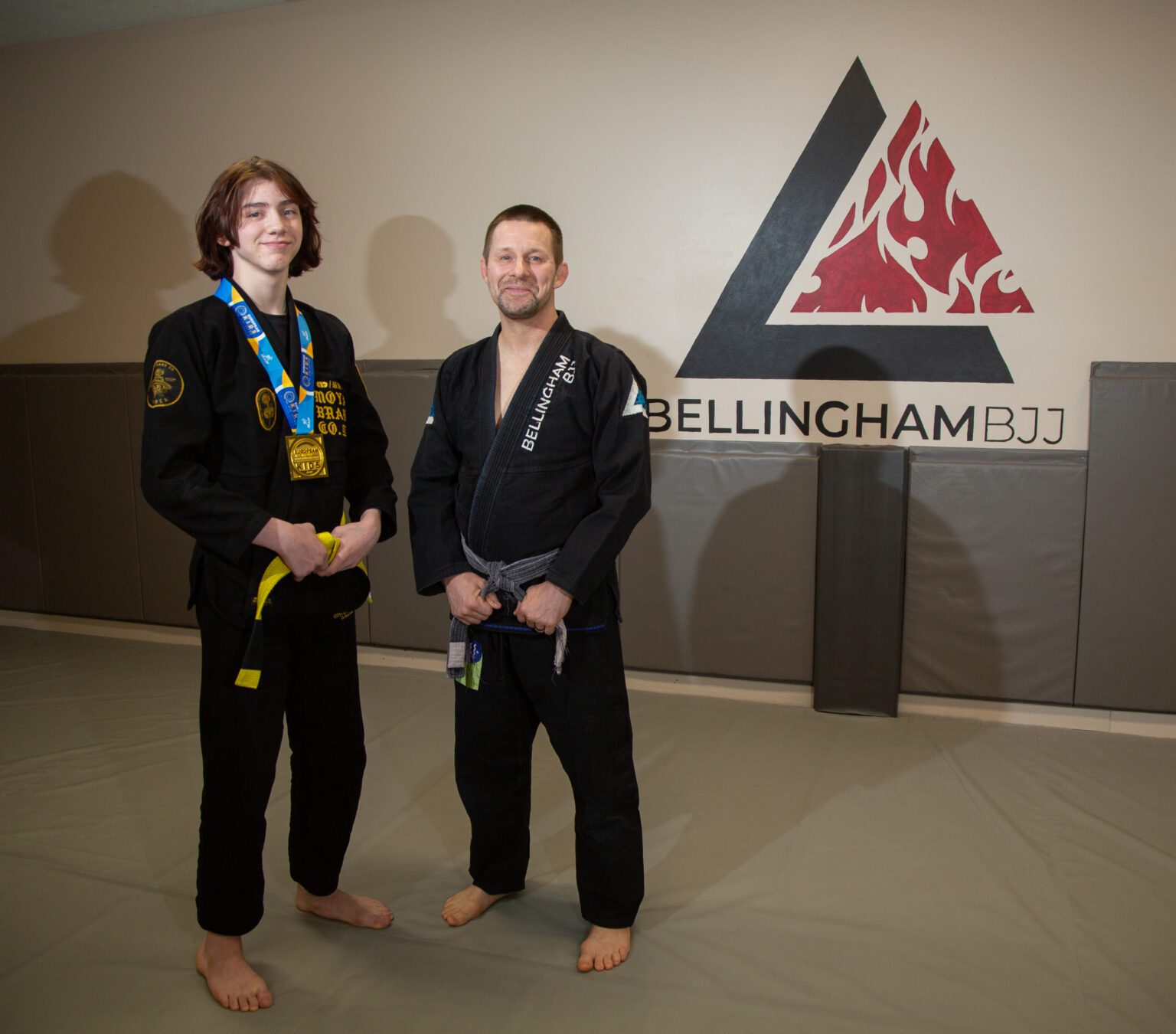It’s 5:30 a.m. on a Monday and Marcel Senger, 14, is awake and preparing for the first of two jiu-jitsu classes of the day. Becoming an international champion at such a young age demands a rigorous training regimen.
He arrives at his gym, Bellingham BJJ, for a 6 a.m. session with his coach and owner of the mat-laden establishment, Jeff Shaw. The pair have worked together for the last two of the five years Senger has competed in the sport.
After the session, Senger returns home to eat breakfast and prepare for the rest of his day as a freshman at Sehome High School. Senger has another class at 6 p.m. that evening, where he will wrap up one of his thrice-weekly, two-a-day trainings — the remaining two yet to come on Wednesday and Friday.
Senger trains at least nine times a week after adding one evening session on Tuesdays and Thursdays in addition to a Saturday takedown and competition class.
He saw that work pay off in glowing fashion on Dec. 4, winning his division at the International Brazilian Jiu-Jitsu Federation (IBJJF) 2022 European Kids Jiu-Jitsu Championship in Dublin, Ireland.

“It was amazing,” Senger said. “I felt proud of myself; it was all just an awesome experience.”
Success has come in bunches for Senger after winning the IBJJF American National title back in July. The IBJJF is the largest, most prestigious organization that hosts Brazilian jiu-jitsu competitions across the world, Shaw said.
There are many divisions within each competition, each organized by age, weight and belt rank — Senger won the male, teen three, yellow belt, super-heavyweight division.
At the European championship, he had to go up an age and weight class to compete, since nobody had entered in his native bracket.
“For Marcel to enter a division with kids who are not only older, but also bigger in the super-heavyweight division, and to submit both of his opponents, is extremely impressive,” Shaw said. “Submission is the highest form of victory in jiu-jitsu.”

Matches are scored based on a points system. Successfully getting your opponent into a particular position or completing one of many specific maneuvers earns points. A competitor can also win by advantage, which is essentially a referee decision. Submission is an immediate victory.
Senger achieved that outcome against both opponents — one of which was an age and weight bracket above his typical competition, and another who was multiple weight brackets higher.
“In jiu-jitsu, you always want to make sure that your techniques work, no matter the size, no matter the strength, no matter the physical attributes of the opponent,” Shaw said.
Senger won his semifinal match against Maximus Zgardan of Ireland by straight armlock submission in less than 30 seconds. The final, against Maxwell Kelly of the United Kingdom, wasn’t so straightforward.
“In the final, [Maxwell] definitely had a very clear gameplan he was going for,” Senger said. “He, right away, tried to pull for a triangle [choke], and he got it locked — I escaped it, luckily.”
Escaping the triangle is an area of submission defense Senger has struggled with, he said. In preparation for the European competition, he had been focusing on that technique. Not only did that benefit him, but he came back to submit Kelly with a triangle of his own.

Jiu-jitsu competitions vary widely in rule sets and techniques that are allowed and prohibited, Shaw said. Certain techniques and maneuvers may be more restricted at a younger competition age. Senger is a complete competitor, Shaw added, and he can succeed under any circumstance.
“His knowledge base is much broader than that,” Shaw said. “He knows techniques that many adults don’t know, and techniques that aren’t necessarily going to help him win now but will help him win once he becomes an adult blue belt.”
Belt ranks in jiu-jitsu are split into kids and adults. Kids’ belts go from white to green, the last rank before blue; adults advance from white to blue, then purple, brown and finally, black. By rule, Senger cannot receive a blue belt until he is 16 years old, even if his skill level merits it — which it does, Shaw said.
“He’s as good training with a brand-new person, who is less physically able than him, as he is training with a 230-pound grown man who is actually trying to harm him,” Shaw added.
In the next year, Senger hopes to repeat as champion of the titles he won in 2022. Additionally, he wants to win the Pan Kids IBJJF Jiu-Jitsu Championship, the most difficult competition to win for kids ages 4–15 due to the sheer number of participants.

Senger wants to continue competing, improving and eventually become a well-respected coach once he is an adult. The community that jiu-jitsu provides is what captured his interest as a child, and it’s also what keeps him coming back.
That applies both in his home gym, Bellingham BJJ, and at competitions worldwide.
“The competitors are all awesome,” Senger said. “I’ve made lots of friends with my fiercest competitors.”
Shaw said Senger has the work ethic, determination and dedication to continue dominating his sport, but his maturity and attitude are what will ultimately propel him to his goals.
On top of that, he is growing as a leader for those coming up under him at the gym.
“The true mark of an exceptional jiu-jitsu practitioner is someone that not only succeeds themselves but makes everyone around them better,” Shaw said. “Even though Marcel is at a young age, he already does that. I think if you asked anybody in the gym, they would tell you the same.”




